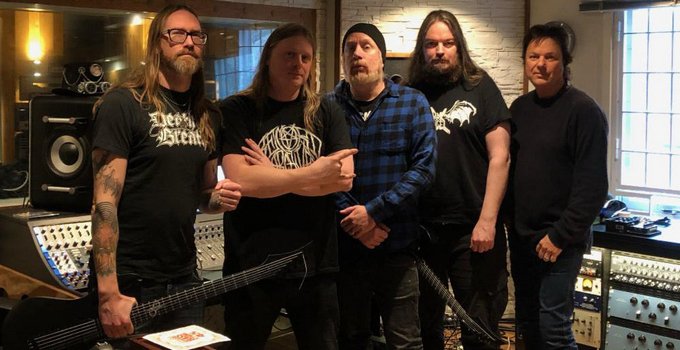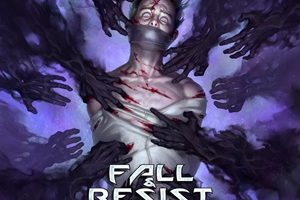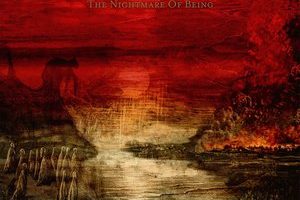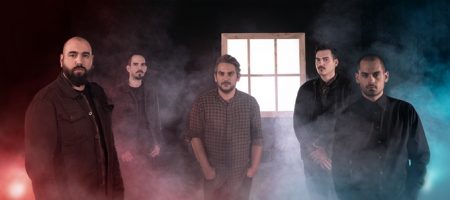At the Gates – Ongoing Nightmares
Sunday, 11th July 2021
A band that has thrived on being experimental throughout their years, despite the massive impact of Slaughter the Soul, At the Gates post-comeback have been really doing their best to avoid redundant waters. Their third release in this era (and seventh overall), The Nightmare of Being, shows the band continuing to blossom from a creative standpoint. It’s 100% At the Gates, but sees them at their most playful and willing to bend the lines. We were able to speak with frontman Tomas Lindberg about the writing process, the shadow of Slaughter of the Soul, and some teacher talk as well.
Dead Rhetoric: What do you feel defines The Nightmare of Being?
Tomas Lindberg: I think every At the Gates album is different. I’ve gotten a lot of feedback from the interviews and listeners that it’s the most free album we’ve done. People have been using the word ‘rebirth’ with the album. I am pretty pleased with that. We only go in and do what we do best. We wanted to do a dark, cinematic, and intricate release this time. It seems like it worked out pretty well!
Dead Rhetoric: I think it has a nice blend to it. You can hear older elements from across the discography but still keeping that dark and ominous feeling the newer releases have had.
Lindberg: Every time we try to top ourselves, but you also learn from each album you do. There’s this process of moving onwards. But for us, it’s that it is in our DNA to write like At the Gates. We won’t lose that core element even if we move forward and try different song arrangements and orchestrations. It will still sound like At the Gates. That’’ what we learned with this one I think.
Dead Rhetoric: This is your second release with Jonas Stalhammar. Do you feel it was a more comfortable fit this time?
Lindberg: When he joined, the last album was totally written. He wrote and recorded a few solos, but now he has been in the band the whole time. Even though the album was written by myself and Jonas Björler, you are influenced by the players you have in the band. When we started writing, I think he subconsciously influenced us – Stalhammar would like to play these parts, he would be excited about these parts because they are right down his alley, playing-wise. He can shine more on this material. I think that’s what his influence did this time around. He’s a good songwriter with his other projects, but it takes a while for a songwriter to adjust to a different band, especially one that has been around for 30 years. It’s hard to just go in and take over and deliver songs.
Dead Rhetoric: The song “Garden of Cyrus” really stood out to me – anything you can say about it?
Lindberg: We had all of these influences all the time like King Crimson and Goblin and all of these bands that we had been listening to since we were teenagers. We had this idea to incorporate those influences early on, but we didn’t have the capability playing-wise or song arrangement-wise to do it. It became this very pretentious, chaotic mess on the first records [laughs]. I’m proud of them, but nowadays we can incorporate it more seamlessly, the At the Gates sound, so it still sounds like At the Gates. “Garden of Cyrus” is almost like an homage to King Crimson. We really wanted to try an At the Gates song that sounds like At the Gates but had a totally different orchestration and arrangement to it. That’s what we set out to do. Also, incorporating improvisation into a very strict music form that we play it – it was intriguing as well.
Dead Rhetoric: What are some of the lyrical topics of The Nightmare of Being?
Lindberg: Every album since the comeback has been centered around different concepts. When we started with At War with Reality, it was an idea that we had in order to prove to people that this is important to us – this is how much work we are going to put into this. We aren’t just going to deliver Slaughter of the Soul Part II every time. We are going to do something big every time – a new, bigger project. I have been intrigued with concept records ever since At War with Reality, and I can’t seem to get away from them now. You always have to start somewhere. I had two or three ideas I wanted to develop, but I kind of stumbled about pessimism. Martin [Larsson] gave me a book by Thomas Ligotti called The Conspiracy Against the Human Race and it kind of snowballed from there because he has a lot of references to other pessimist philosophers in there. It drew me in, and I noticed early on that this was perfect for the kind of emotions we wanted for the record; it went hand-in-hand with it.
Dead Rhetoric: You mentioned the conceptual piece – do you feel there’s a difference in the way that you approach lyrics now as opposed to when you were just starting out?
Lindberg: I think the idea that I want the lyrics and music to work together to create an emotional impact on the listener – that has been there since the first mini-album. That has been the main idea of what I do. But of course, now they are more grounded and have a theoretical base that they didn’t have before. I read up on the material before and try to really understand what I am writing about more than what I did back then. I think that also started with At War with Reality. I discovered that I could write in different layers, with this intertextual, multilayered type of lyrics. That has been my driving force. It’s very hard for me to write what you would call ‘normal lyrics’ anymore [laughs].
Dead Rhetoric: Having released 3 albums now post-hiatus, what feels different now versus in the ‘90s?
Lindberg: I think we are more secure about what At the Gates is. We know why it is important to us, and why we want to be creative – in a different way than before. Then it was more of a rollercoaster ride in that we didn’t know where it would take us. Nowadays it is more controlled in a sense. But that kind of control also gives us room to be more experimental in what we are doing because we know more about who we are as individuals and as a band.
Dead Rhetoric: Like you were saying before, you know what At the Gates is, so you can move things about more freely into different directions.
Lindberg: Exactly. It’s easy to just be experimental – anyone can do that really if you have the musical capability. The challenge is to still sound like At the Gates, and I like that. To be curious and creative and experimental, but within certain limits. That’s a driving force for us.
Dead Rhetoric: You are a teacher as well. What do you see as parallels between being a frontman and a classroom teacher?
Lindberg: In one way, I would say that I’m a social person but I’m pretty reserved in my normal life as well. I keep to myself and closer friends. But in the classroom and on stage, I can be more in the center without feeling uncomfortable. I know what I’m doing [laughs] a little bit more. I’m the worst if someone were to throw a surprise party for me [laughs]. I would feel uncomfortable the whole time. But on stage and the classroom, because I have control over the situation I love that. It’s like getting people interested, connecting with them, portraying a message or idea to them, and actually delivering it. That’s what drives me. For like maybe 10 years now, I tried to not go in and out of roles – be the same person the whole time, both privately, the classroom, and on stage. I think that tires you out as a person. You have to change who you are all the time, at different parts of the day. You learn a lot from that too – just being myself in the classroom.
Dead Rhetoric: I totally get that – with the teaching aspect, I think it just comes with time and experience in the classroom. Knowing who you are.
Lindberg: Yeah, and if you can connect then with the students, it’s much more rewarding. You did it, not some tool that you learned. It’s a real connection.
Dead Rhetoric: Does doing both roles give you a different sense of fulfillment?
Lindberg: In one way, yeah. But it is kind of similar in one way. You kind of thrive on that reward of the connection between the crowd, or students in the classroom. If you succeed in that, it’s a similar emotion I would say.
Dead Rhetoric: What do you feel that you are most satisfied with, artistically, since getting the band back out there and releasing new material starting with At War with Reality?
Lindberg: Every artist will say that the latest record is the [best] but in one way, I’m most proud of the achievement of coming back with At War with Reality. That was scary! I think the way that we tackled that project, as I said before, we proved that it was important to us. It wasn’t something we were doing for money or for a career – it’s almost the opposite. We could go out and play for twenty more years doing Slaughter of the Soul. But we wanted to be creative together. We wanted to prove why it was important for us. With that achievement, now when we go out and play live the songs from At War with Reality are as well received as the ones from Slaughter of the Soul, which is amazing. I’m really proud of that.
Dead Rhetoric: Does it ever get frustrating, with some people just fixating on Slaughter of the Soul and not really focusing as much on the rest of the back catalog?
Lindberg: I guess for me, Slaughter of the Soul is the pinnacle achievement of that era in one way. We started out as this really experimental band and then record by record we compressed the songwriting process more and more. Slaughter of the Soul was the end result of that first era. But there was nowhere we could go after that without repeating ourselves. We needed to take a break and recharge the batteries and creativity. I’m cool with it. The ghost of Slaughter of the Soul has left the building a little bit. We are totally fine with it. We see that the new songs go over just as well.
Dead Rhetoric: I have always had a soft spot for Terminal Spirit Disease. What do you recall about the time surrounding that release?
Lindberg: It was right after Alf [Svensson] had left the band. We still had a lot more melodic parts that we wanted to do more with. But as I was saying, we started to compress the songwriting a bit more and take away all the filler riffs. That was the first step towards Slaughter of the Soul. But I really agree with you, Slaughter of the Soul could have had more melodic elements and not suffer from it. So that’s what we tried to do more with At War with Reality – to combine those two albums a little bit.
Dead Rhetoric: What has a lifetime in heavy metal taught you?
Lindberg: It’s hard to say. Extreme music, to me, is as important as it was back then but for different reasons. I think it’s more like a gift that music has given me. I have been able to pursue that dream and still be doing it at this age, after all this time. I think I’m more humble than ever. Maybe that’s something that music has done. We love what we do, we love the history of extreme music, and we can understand it. It makes me humble that we could be a part of it.
Dead Rhetoric: Anything else you wish to achieve on a bucket list?
Lindberg: This is like a standard reply but we had a bucket list when we started the band and that was to record a demo and get it reviewed in a fanzine. When we had done that, everything else has been a bonus. We just love what we do so much – we are still curious and we want to develop the band. We see where the music takes us, and that’s an inspiring and exhilarating journey. We are also very humble to that fact. We are so happy with what we have been able to achieve and the feedback from the listeners. We are happy to just be here and continue.
Dead Rhetoric: Kind of like what you were saying before with coming back to the band. It wasn’t a cash grab so much as you wanted to continue.
Lindberg: Yeah, we were really sticking our necks out doing it. Everyone could have hated it. We did it for ourselves.
Dead Rhetoric: As a musician, and a teacher as well, what concerns do you have coming out of the pandemic?
Lindberg: There’s a lot of longing for people to be able to see family and friends that they haven’t been able to see. I think what we have learned from this pandemic is to appreciate the small things and more unmaterialistic things in life. It’s a good thing. We will see how long it takes for humanity to forget all of that and continue as before [laughs]. But I have some hope that some people have gotten more insight into what is important in life. I know for sure that I have.
Dead Rhetoric: Were there any hobbies that you picked up or revisited?
Lindberg: No, not really. It’s still the same – reading and music [laughs]. Last summer, when the restrictions were up and you couldn’t go very far, my wife and I went on bikes throughout the Gothenburg area and exploring nature. So maybe stuff like that – being more physical and going out in nature, enjoying art or architecture. Stuff like that has been more of my focus lately, than the usual record hunt.
Dead Rhetoric: The album will be out in July. What’s planned for the rest of 2021?
Lindberg: In one way, we could have sat on the album for a while longer to see if everything opens up. But when it was recorded, we just thought about what we, as listeners, would want. We would want to hear music from our favorite band as soon as possible. It doesn’t matter if you can see them live or not. So I think we just wanted to get it out as soon as possible, even though we might not be able to get out and support it right away. We have some shows that are not cancelled or postponed yet in 2021, but we have been booking shows from December onwards – more massive touring for the record. This record needs maybe 10 spins or so to wrap your head around it. Maybe it’s good that people have a little longer before we play live for them.




























